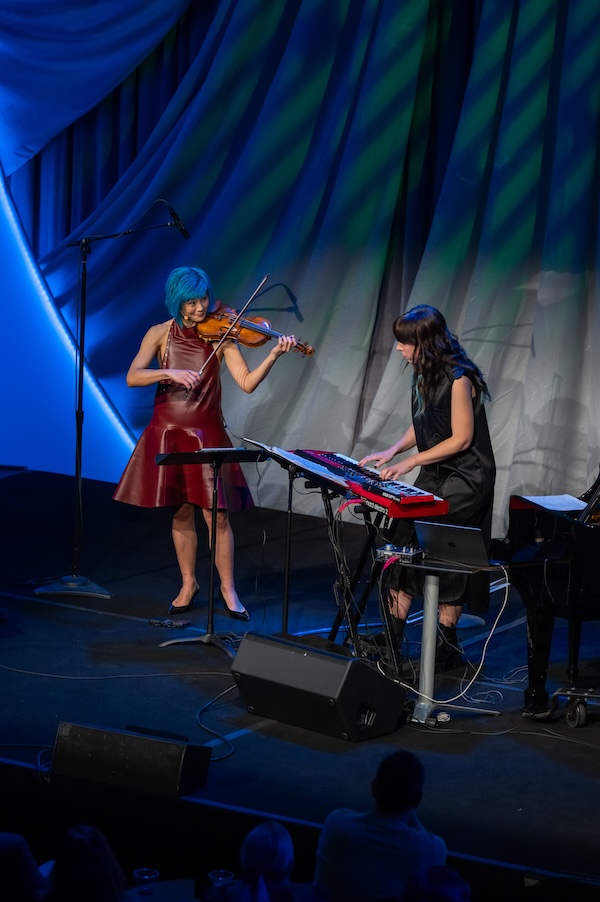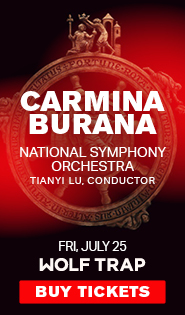Koh and Mazzoli branch out from traditional chamber concert with uneven results

Jennifer Koh and Missy Mazzoli performed at the Kennedy Center’s Studio K Friday night. Photo: Derek Baker
Jennifer Koh took over as artistic director of the Fortas Chamber Music Concerts series at the Kennedy Center in late 2022. The programming may still bear the mark of her predecessor, Joseph Kalichstein, but her performances this season offer a glimpse into the dual future of this esteemed series. Last December, she partnered with her mentor, violinist Jaime Laredo, in a nod to the past, while Friday night’s concert with composer Missy Mazzoli reached for something new and different.
Koh and Mazzoli, in an hour-long program without intermission, surveyed the results of their musical collaboration over the last decade and a half. Reflecting that contemporary shift, they also moved the venue from the series’ traditional home in the Terrace Theater to Studio K, a club-like setting where the small audience sat grouped at tables or on sofas, with a bar at the back of the room serving drinks before the performance. The move represented a rare attempt to bring classical music into the underground confines of the recently built annex known as The Reach.
Mazzoli’s greatest success has come from her work in opera, which has been extraordinary. Hearing all of her violin works, created with Koh in mind, in a single evening left the impression of a disappointing sameness, with the echo of many similar elements from work to work.
The earliest piece, Dissolve, O My Heart, from 2011, came first. Commissioned as part of Koh’s performance project inspired by the solo works of Bach, the piece opened with a brief quotation from the “Chaconne” movement of Bach’s Solo Violin Partita No. 2. Mazzoli immediately subverts this opening harmonic gesture in what becomes a ruminative exploration of the structure from many angles, with folksy bends and rhythmic variety. The piece was not meant to be amplified, a sonic treatment that did the music no favors, unpleasantly magnifying all the little wobbles and scratches.
The next piece, “Interlude,” was a mixture of pre-recorded tracks, or so it seemed (it was omitted from the evening’s program notes). Mazzoli controlled the levels of the various sounds, bringing out at various times bell-like rings, percussive beats, and voices singing wordless harmonies, all motifs heard again and again throughout the evening, beginning with the very next piece, again following without a break.
Mazzoli composed A Thousand Tongues for cellist Jody Redhage, who both played the solo part and sang a vocal part over a recorded track. Koh did not sing in this violin version, with Mazzoli adding tremolos on the piano, but the recording included vocal sounds. As with all music performed to a recording, the metronomic pacing deprived the performance of most of its spontaneity.
Tooth and Nail, inspired by the twanging sonorities of Uzbek jaw harp players, created a similar impression. Created for violist Nadia Sirota, the prerecorded track featured mostly samples played on a viola. After some repetitive motifs, not much sense of the folk instrument remained, and Koh’s solo part did not always sync with the track or Mazzoli’s occasional input. Afterward, Koh asked the sound staff for help with her monitor, which she said was making it difficult for her to hear, likely explaining the rhythmic disjunction.
Kinski Paganini, the second piece Mazzoli wrote for Koh, offered a brief burst of fresh air. With no straitjacketing recorded track, the violinist discharged the virtuosic multi-string challenges with refreshing vivacity. Mazzoli then played The Night Ahead and No Real Fate, originally for piano, four hands, in a solo version. Written so that every key of the piano is struck at some point, the sprawling keyboard part was partially covered by another prerecorded track.
The pattern repeated in Song for Mick Kelly, created for Mazzoli’s alt-classical band Victoire. This duo version again included ostinatos and voices floating on a prerecorded track, before fading to silence. From Koh’s pandemic-era recording, Hail, Horrors, Hail recalled the virtuosity and freedom of the earlier piece for solo violin. A different kind of rehash came in the most recent work on the program, All I Want Is All of It, in which Koh played against a remix of all of Mazzoli’s earlier pieces for her, to not much effect.
Mazzoli adapted the last movement of her Violin Concerto, premiered by Koh with the National Symphony Orchestra in 2022, in Procession Ascending. She rendered the dreamy orchestral part on Tangerine Dream-style synthesizer. Filters echoed the sound of Koh’s violin in the final piece, Vespers for Violin, but the overall effect remained much the same.
The programming and the venue reinforced the sense of a traditional series trying, perhaps too desperately, to be cool. It would be an admirable idea to create a more active nightlife at the Kennedy Center, but that is difficult when the bar is locked up before 9 p.m. The performers and their listeners had to go next door to the Watergate for a post-concert libation.
The young Abeo Quartet will perform music of Shostakovich and Beethoven at the Justice Forum, also in the Reach, 7:30 p.m. March 6. kennedy-center.org


